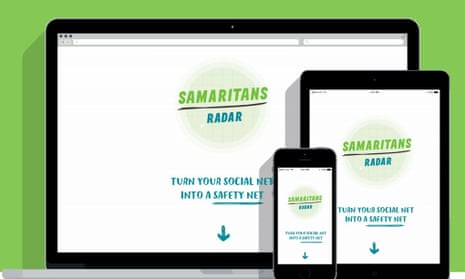Suicide prevention charity Samaritans is mining Twitter for signs of people “struggling to cope”, with the aim of alerting their friends and advising them on how to provide support.
Samaritans Radar launched today as a website that will “flag potentially worrying tweets that you may have missed” once Twitter users register their details.
Developed by digital agency Jam, the service will analyse tweets for phrases and keywords that may indicate someone is at risk for suicide, then email friends registered with Samaritans Radar with advice on how to help.
The phrases include “tired of being alone”, “hate myself”, “depressed”, “help me” and “need someone to talk to”, although Samaritans admits that the algorithm is likely to evolve over the coming months, to avoid false positives.
“Samaritans Radar is in its infancy and won’t get it right every time - it’s not good at sarcasm or jokes yet,” explains the website. “But there’s a way for you to give feedback on whether a Samaritans Radar alert was correct, so the service improves for everyone as it learns more.”
The charity has also built a “whitelist” of Twitter accounts belonging to organisations who regularly tweet using the keywords that it’s monitoring, to ensure they are ignored by its alerts system.
Samaritans is also stressing Radar’s privacy aspects, sending alerts to users as emails rather than tweets, and never posting to Twitter on a registered user’s behalf.
“We know that people struggling to cope often go online looking for support, however, there is still so much we need to learn about why this happens and how we can make the online environment safer for vulnerable people,” said Joe Ferns, executive director of policy, research and development for Samaritans.
“By not addressing this issue we run the risk of shutting these discussions down and driving them underground. Instead we need to use tools such as Samaritans Radar to encourage people to look out for one another online, helping them to reach out and offer support.”
Samaritans Radar is aimed at the 15m Twitter users in the UK, and particularly at 18-35 year-old “millennials” who are the most active group on the social network.
“Twitter actively forges partnerships with organisations in the field of online safety and digital citizenship, and Samaritans has a longstanding reputation for supporting people in times of need,” said Twitter’s global head of trust and safety outreach Patricia Cartes.










Comments (…)
Sign in or create your Guardian account to join the discussion